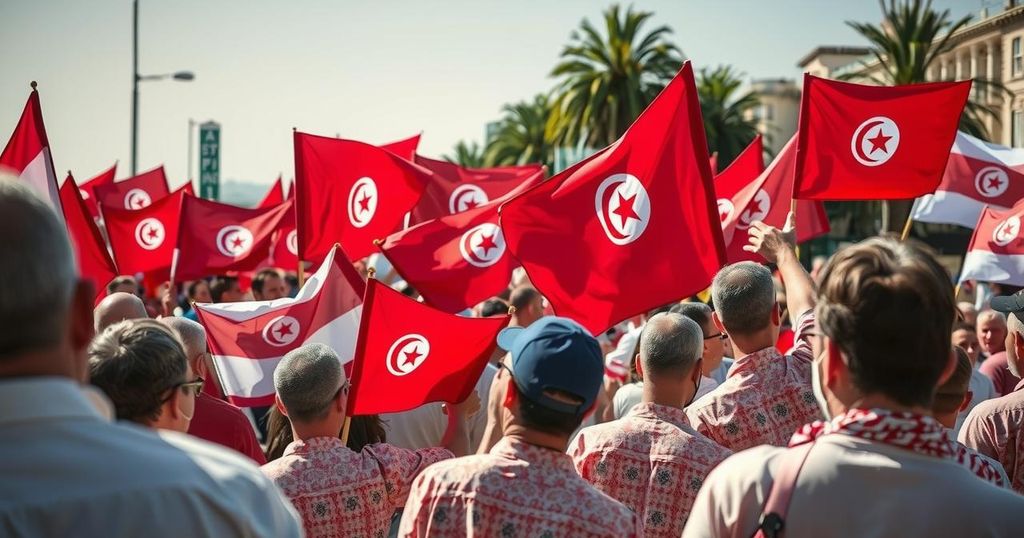Tunisia Revolution Anniversary: Syria’s Ouster of Assad Inspires New Hope

The anniversary of Tunisia’s revolution is marked by a somber realization of suppressed freedoms under Kais Saied’s regime. However, the recent fall of Bashar al-Assad in Syria reignites hope for liberation among Tunisians and highlights the enduring struggle for democracy and justice. This situation serves as a potent reminder that, even amidst repression, the fight for freedom persists and can inspire positive change throughout the region.
As Tunisia observes another anniversary of its revolution, the mood is tinged with sorrow due to the current authoritarian regime under President Kais Saied, who has repressed commemorations of the 2011 uprising that ousted Zine El Abidine Ben Ali. Numerous demonstrations are now prohibited, and January 14, once a symbol of national pride, is merely a regular workday. Nevertheless, the recent toppling of Bashar al-Assad’s regime in Syria injects renewed hope into the struggle for freedom across the Arab world, instilling a sense of resilience and affirmation that the quest for dignity will not be extinguished.
After enduring fourteen years of strife, Syrians have achieved the seemingly impossible by dethroning their tyrant. This event not only signifies a monumental victory over oppression but also inspires those still yearning for freedom, such as Tunisians, who witness this resurgence of spirit reminiscent of their own revolution.
The narrative of Syria serves as a formative lesson underscoring that although revolutions face overwhelming challenges, they cannot be suppressed indefinitely. Tunisia’s past echoes the sentiment of Aboul-Qacem Echebbi, the revered poet of love and revolution: “If the people one day desire life, fate must surely answer their call.” The Tunisian populace stands in solidarity with their Syrian counterparts who celebrated the fall of an oppressive regime, signaling that the Arab Spring’s spirit of defiance is far from extinguished.
Despite the complexity of political transitions marked by turmoil and the rise of counter-revolutionary activities, the metaphor of revolution remains relevant. Progress may not align linearly, but revolutions will ultimately surface through consistent struggle. As Tunisia grapples with authoritarianism and systemic challenges, it must not underestimate the potent lessons yielded by Syria’s experience.
Today’s anniversary serves as a reminder that the journey toward establishing a stable political framework is often lengthy and fraught with tribulations. Leaders of the opposition face persecution, yet their commitment emphasizes that the aspiration for justice and freedom persists. The liberation of Syria serves as a beacon of hope, suggesting that the sacrifices made in the pursuit of a just society will ultimately lead to triumph, not just in Syria but across Tunisia and the broader region as well.
The anniversary of the Tunisian revolution marks a significant moment in North African history, signifying the beginning of widespread movements against authoritarianism known as the Arab Spring. However, the current political climate in Tunisia has shifted dramatically since 2011. Under Kais Saied’s regime, strict limitations on political dissent and the commemoration of revolutionary milestones have led to public disillusionment. In contrast, recent developments in Syria, particularly the ousting of Bashar al-Assad, serve to renew regional hopes for liberation and resilience against oppression, reflecting parallels between the struggles faced by the two nations.
In conclusion, the anniversary of Tunisia’s revolution juxtaposed with Syria’s recent triumph over tyranny accentuates a broader narrative of hope and resilience within the Arab world. While Tunisia currently faces challenges in its democratic evolution, the lessons from Syria reinforce the notion that revolutions, though fraught with difficulties, can yield transformative change. This moment underscores the importance of solidarity among peoples facing similar struggles, inspiring continued efforts towards justice and democracy across the region.
Original Source: www.middleeasteye.net








